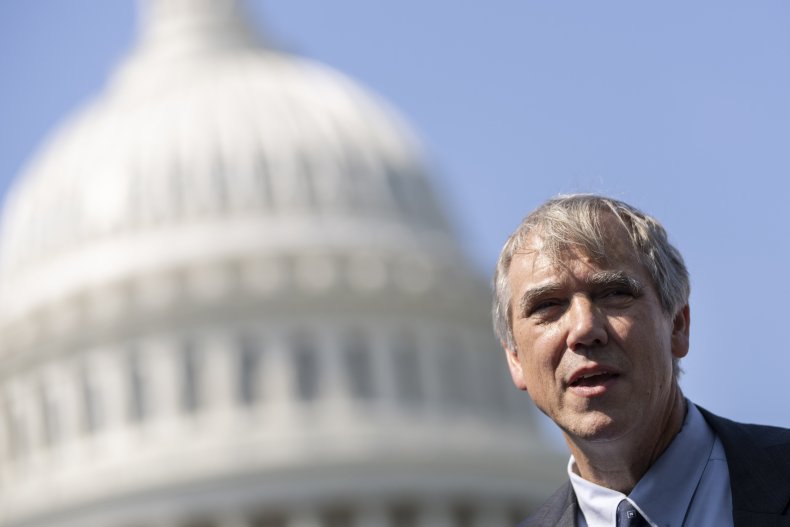Concern is mounting on Capitol Hill that the federal spending cuts proposed by House Republicans to the country’s top natural resource management agency could hinder America’s ability to compete with China.
The fiscal year 2024 funding bill for the Department of the Interior and a number of environmental programs that advanced through committee on Wednesday includes more than $13.4 billion in spending cuts, a 35-percent reduction in funding from 2023.
One of the programs being cut is the U.S. Geological Survey (USGS), which would see its funding drop by nearly $150 million, reducing the agency’s total budget to around $1.35 billion—$438 million below President Joe Biden’s ask. The USGS provides scientific research on U.S. energy, minerals, and other natural resources, along with studying natural hazards that threaten national security.
“We have many environmental challenges to tackle, and we need more robust funding, not less,” Democratic Senator Jeff Merkley of Oregon, who chairs the Appropriations Subcommittee on Interior, Environment, and Related Agencies, told Newsweek.
Merkley acknowledged that competition with China for resources stands as a consideration when determining future spending numbers, particularly as the two country’s battle for supremacy in the clean energy sector.
“There’s a lot of good work done on the geological side that becomes even more important, as we need a lot more ingredients to make a fast transition to renewable energy,” he explained, “so that’s certainly weighs in against handicapping ourselves.”

Photo by Drew Angerer/Getty Images
In a written statement on February 22, the White House said that China controls “most of the market for processing and refining for cobalt, lithium, rare earths and other critical minerals.” These minerals are key to the production of computers and batteries, as well as in powering green energy technologies like electric vehicles, wind turbines and solar panels. The nonpartisan Brookings Institution similarly drew attention to this phenomenon last year. And five years earlier, USGS reported that America was relying on China for 24 of the 47 mineral commodities that it imported.
Republican Congressman Mike Simpson of Idaho, who chairs the House Appropriations Subcommittee on Interior, Environment, and Related Agencies, did not respond to Newsweek‘s request for comment in time for publication.
However, his committee’s statement on the legislation says that the bill expands access to critical minerals by reinstating leases in Minnesota’s Superior National Forest and ensuring that mining activities, including exploration operations and construction of mine access roads, are permitted whether or not a valuable mineral deposit is discovered.
“We had to cut funding for some of my favorite programs in this bill, but it was necessary,” Simpson said during the July 19 mark-up of his bill. “With the national debt in excess of $32 trillion and inflation at an unacceptable level, we must make tough choices to ensure we do not saddle our children and grandchildren with overwhelming debt.”
With the September 30 deadline for funding the government drawing near, pressure is mounting for the House and Senate to come to an agreement on spending numbers. If the two chambers are unable to reach an agreement for fiscal year 2024 and cannot concur on an extension of 2023 spending levels, the country could face a government shutdown.
Alaska Senator Lisa Murkowski, who serves as the top Republican on Interior, Environment, and Related Agencies Appropriations, said her subcommittee’s bill can often be one of the “most problematic” when it comes to reaching bipartisan consensus. The bill deals with public lands and environmental issues which can prove contentious, she said.
When asked by Newsweek about USGS, Murkowski said that she is a “big supporter” of its work and wants to make sure it’s able to carry out its mission. At the same time, she recognizes this divided Congress faces numerous challenges this year on the appropriations as House Republicans seek broad spending cuts.
Murkowski said she believes she and Merkley are in a “better spot” in terms of current spending negotiations and that U.S. competitiveness around natural resources and critical minerals remains a priority.
“You better believe me, I am one who has been very aggressive, very forward-leaning in making sure that we do not cede any further ground when it comes to critical minerals,” Murkowski told Newsweek.
Stay connected with us on social media platform for instant update click here to join our Twitter, & Facebook
We are now on Telegram. Click here to join our channel (@TechiUpdate) and stay updated with the latest Technology headlines.
For all the latest For Top Stories News Click Here
